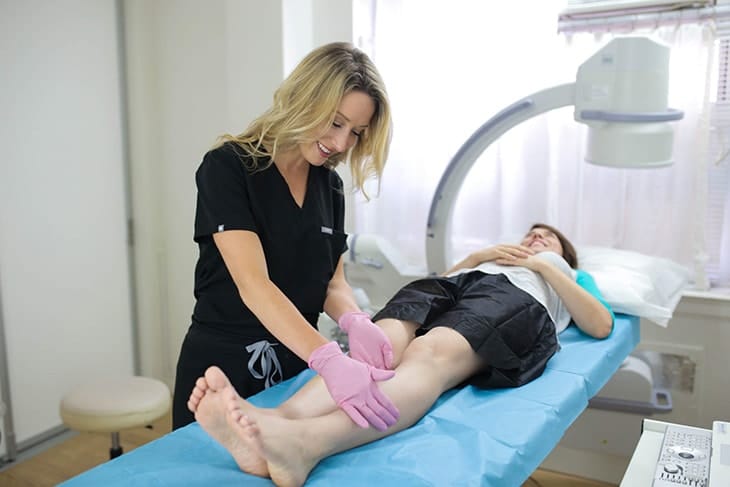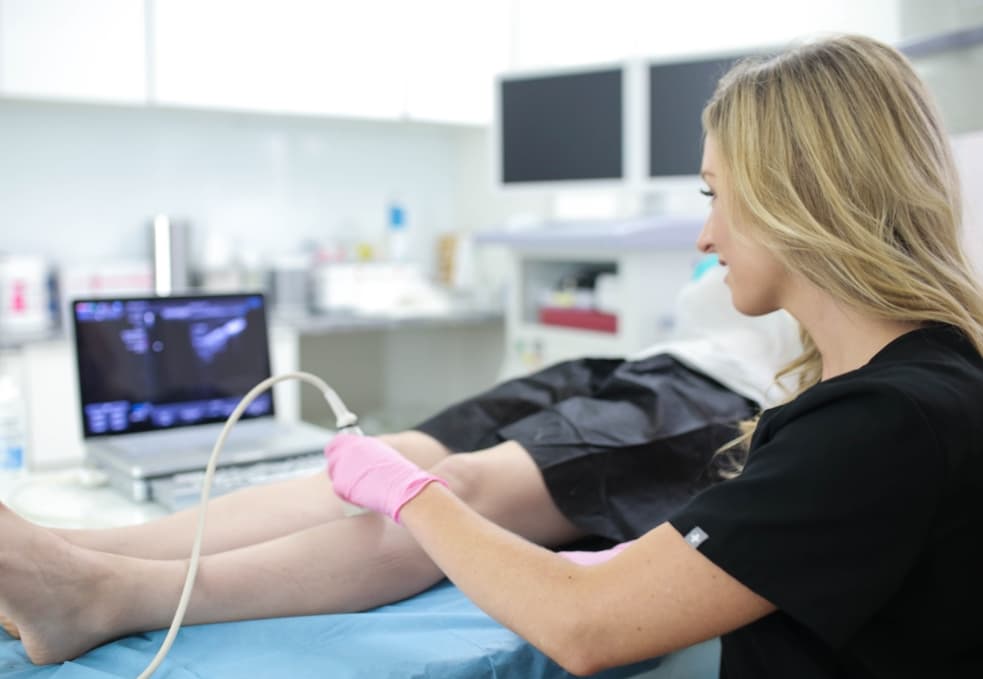Do you ever feel like your legs are heavy and tired, making it difficult to move around and complete daily tasks? This is a common concern, but don’t worry — there are ways to alleviate the discomfort and get back to feeling like yourself again. In this article, we’ll be answering some frequently asked questions about heavy legs and provide you with some tips and tricks for relief.
Long Island Vein Center is a state-of-the-art medical center dedicated to helping you achieve optimal vein health. Our team is led by board-certified vein doctors who use cutting-edge diagnostic techniques and technologies to identify and treat the root cause of your heavy legs and other symptoms.
We have state-of-the-art offices in West Islip, Jericho, Port Jefferson, and Hampton Bays. If you’re on the north shore of the island, you can visit your nearest vein center at 350 Jericho Turnpike Suite 1A, Jericho, right off the long island expressway. Please schedule an appointment at your nearest vein center in Long Island.

How do you treat heavy legs?
Treating heavy legs caused by chronic venous insufficiency (CVI) or varicose veins requires a combination of lifestyle changes and medical interventions. Chronic venous insufficiency occurs when the veins in your legs are unable to pump blood back to your heart effectively, causing blood to pool in your legs and leading to swelling, discomfort, and a heavy feeling in the legs.
Here are some of the most effective ways to treat heavy legs caused by CVI:
- Exercise: Regular physical activity, such as walking or swimming, can help improve blood flow and reduce swelling in the legs. Exercise also strengthens the muscles in your legs, making it easier to pump blood back to your heart. Aim for at least 30 minutes of moderate physical activity per day.
- Compression stockings: These special stockings apply pressure to the legs, improving blood flow and reducing swelling. They are particularly useful for people with CVI or varicose veins who spend long periods of time on their feet. Your vein doctor can help you select the right type of compression stocking for your needs.
- Elevation: Elevating your legs above your heart can help reduce swelling and relieve discomfort. Try elevating your legs for at least 15 minutes every hour, especially if you spend a lot of time sitting or standing.
- Weight management: Maintaining a healthy weight can reduce the pressure on your legs and improve circulation. Losing weight can also help relieve pressure on veins and reduce the likelihood of developing varicose veins.
- Healthy diet: Eating a diet rich in fruits, vegetables, and whole grains can help you maintain a healthy weight and improve blood flow. Avoid foods high in salt, as they can cause fluid retention and swelling in the legs.
- Medical procedures: Minimally invasive varicose vein treatments, such as endovenous laser ablation or radiofrequency ablation can treat varicose veins and the underlying vein problems. These procedures involve using thermal energy or laser energy to destroy the diseased vein, facilitating their gradual absorption by the body. The accumulated blood reroutes into healthier leg veins, restoring optimal blood circulation to the heart.
It is important to talk to a vein doctor before trying any of these treatments, as they may not be appropriate for everyone. In some cases, underlying medical conditions may need to be addressed before treating heavy legs. With the right combination of treatments, you can find relief from heavy legs and get back to feeling like yourself again.
What are the symptoms of vein disease in your legs?
Vein disease in the legs can cause a range of symptoms, including:
- Swelling in the legs or ankles
- Aching or pain in the legs, especially after standing or sitting for long periods of time
- Tired or heavy feeling in the legs
- Itching or burning in the legs
- Restless leg syndrome or cramping at night
- Skin discoloration or ulcers near the ankles
If you experience any of these symptoms, it is important to see a vein doctor. Early treatment can help prevent vein disease from getting worse and can improve your overall quality of life. Your vein doctor may perform a physical exam, ultrasound, or other tests to diagnose vein disease and determine the best treatment plan for you.
Can vein disease be cured?
Vein disease, specifically chronic venous insufficiency (CVI), can be treated, but it cannot be cured. CVI occurs when the veins in your legs are unable to pump blood back to your heart effectively, causing blood to pool in your legs and leading to swelling, discomfort, and a heavy feeling in the legs.
The difference between treatment and cure lies in the underlying cause of the disease. A cure is a complete solution that eliminates the root cause of a disease, while treatment only addresses its symptoms. In the case of CVI, the root cause is structural damage to the veins in your legs. This damage cannot be reversed, and the veins cannot be restored to their original state.
However, CVI can be treated effectively through a combination of lifestyle changes and medical interventions. Treatment options include regular exercise, compression stockings, elevating the legs, maintaining a healthy weight, eating a healthy diet, and minimally invasive varicose vein treatments, such as radiofrequency ablation, endovenous laser ablation, and VenaSeal.
With the right combination of treatments, you can find relief from heavy legs and improve your overall quality of life.
Why do my legs feel very heavy when I walk?
Your legs may feel very heavy when you walk due to a number of factors, including:
- Chronic venous insufficiency (CVI): CVI occurs when the veins in your legs are unable to pump blood back to your heart effectively, causing blood to pool in your legs and leading to swelling, discomfort, and a heavy feeling in the legs.
- Varicose veins: Varicose veins are swollen and twisted veins that often occur in the legs. They can cause discomfort and a heavy feeling in the legs.
- Overuse: Overuse of your legs, such as walking or standing for long periods of time, can cause fatigue and a heavy feeling in the legs.
- Dehydration: Dehydration can cause your legs to feel heavy, as it decreases the volume of blood in your body and makes it harder for your blood to circulate effectively.
- Muscle fatigue: Overworking your muscles can cause them to become fatigued, making your legs feel heavy and difficult to move.

